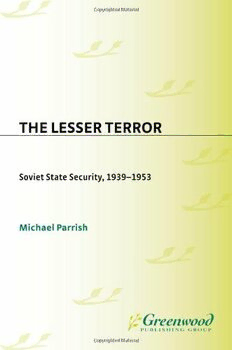Download The Lesser Terror: Soviet State Security, 1939-1953 PDF Free - Full Version
Download The Lesser Terror: Soviet State Security, 1939-1953 by Michael Parrish in PDF format completely FREE. No registration required, no payment needed. Get instant access to this valuable resource on PDFdrive.to!
About The Lesser Terror: Soviet State Security, 1939-1953
Based on Glasnost revelations and recently released archival material, this study covers the operations of Soviet state security from Beriia's appointment in 1938 until Stalin's death. The book pays particular attention to the career of V. S. Abakumov, head of SMERSH counterintelligence during the war and minister in charge of the MGB (the predecessor of the KGB) from 1946 until his removal and arrest in July 1951. The author argues that terror remained the central feature of Stalin's rule even after the ''Great Terror'' and he provides examples of how he ''micromanaged'' the repressions. The book catalogs the major crimes committed by the security organs and the leading perpetrators and provides evidence that the crimes were similar to those for which the Nazi leaders were punished after the war. Subjects covered include Katyn and its aftermath, the arrest and execution of senior military officers, the killing of political prisoners near Orel in September 1941, and the deportations of various nationalities during the war. The post-war period saw the ''Aviator'' and ''Leningrad'' affairs as well as the ''anti-cosmopolitan'' campaign whose target was mainly Jewish intellectuals. Later chapters cover Abakumov's downfall, the hatching of the ''Mingrelian'' and ''Doctors'' plots and the events that followed Stalin's death. Finally, there are chapters on the fate of those who ran Stalin's machinery of terror in the last 13 years of his rule. These and other topics will be of concern to all students and scholars of Soviet history and those interested in secret police and intelligence operations.
Detailed Information
| Author: | Michael Parrish |
|---|---|
| Publication Year: | 1996 |
| ISBN: | 9780275951139 |
| Pages: | 456 |
| Language: | English |
| File Size: | 28.99 |
| Format: | |
| Price: | FREE |
Safe & Secure Download - No registration required
Why Choose PDFdrive for Your Free The Lesser Terror: Soviet State Security, 1939-1953 Download?
- 100% Free: No hidden fees or subscriptions required for one book every day.
- No Registration: Immediate access is available without creating accounts for one book every day.
- Safe and Secure: Clean downloads without malware or viruses
- Multiple Formats: PDF, MOBI, Mpub,... optimized for all devices
- Educational Resource: Supporting knowledge sharing and learning
Frequently Asked Questions
Is it really free to download The Lesser Terror: Soviet State Security, 1939-1953 PDF?
Yes, on https://PDFdrive.to you can download The Lesser Terror: Soviet State Security, 1939-1953 by Michael Parrish completely free. We don't require any payment, subscription, or registration to access this PDF file. For 3 books every day.
How can I read The Lesser Terror: Soviet State Security, 1939-1953 on my mobile device?
After downloading The Lesser Terror: Soviet State Security, 1939-1953 PDF, you can open it with any PDF reader app on your phone or tablet. We recommend using Adobe Acrobat Reader, Apple Books, or Google Play Books for the best reading experience.
Is this the full version of The Lesser Terror: Soviet State Security, 1939-1953?
Yes, this is the complete PDF version of The Lesser Terror: Soviet State Security, 1939-1953 by Michael Parrish. You will be able to read the entire content as in the printed version without missing any pages.
Is it legal to download The Lesser Terror: Soviet State Security, 1939-1953 PDF for free?
https://PDFdrive.to provides links to free educational resources available online. We do not store any files on our servers. Please be aware of copyright laws in your country before downloading.
The materials shared are intended for research, educational, and personal use in accordance with fair use principles.

